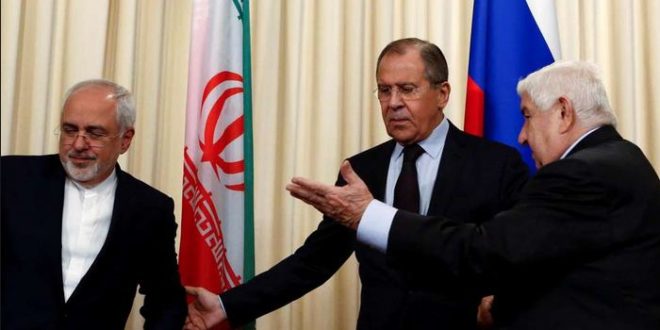By Shehab Al-Makahleh •
Responding to Trump’s cruise missiles attack on Syrian Shayrat airbase, the tripartite meeting of foreign ministers of Russia, Iran and Syria was held today in Moscow. The meeting ended with a resounding ‘no’ to the Washington’s ‘Great Middle East Project’, and with equally resounding confirmation of already established policy of common fight against the plight of terrorism.
A week ago Trump made a sudden change in his proclaimed policy of de-escalation and international cooperation, and during a meeting with Chinese president Xi Jinping ordered a cruise missile strike on a Syrian airbase near Homs, aiming to force Iran and Russia to cease supporting Syrian government.
The trilateral Lavrov-Zarif-Muallem meeting in Moscow today proved Trump, his enemies and his foes wrong about Russian and Iranian responses to the strike. The meeting confirmed that there is no basis for rumors that Russia would abandon either of its two allies in Syria. Moreover, the three parties confirmed that Western media and political establishment are so deeply entangled in their own narratives that they are unable to see the reality.
The reality is that the legitimate Syrian Army under the command of the Syrian government led by its president Bashar al-Assad, with the support of Russia and Iran, is winning the war against various militant groups ― most of which are internationally designated terrorist groups. The strike has clearly not accomplished what it was made to look like. It did not stop or deter Russian or Syrian armed forces, but has only strengthened their resolve to obliterate the terrorists.
Moreover, the strike was conducted based on the information about a ‘chemical attack’ that the US military and intelligence, supposedly, have collected from online sources. The key information sources being al-Qaeda linked ‘rebels’, with dubious tweets and other social media posts that have appeared before the strike was reported to have happened―leading many analysts to conclude that the attack was another ‘false flag’ alike the Iraqi war WMD story fabrication.
This was reiterated by Russian and Syrian officials, including yesterday’s interview with Syrian president Bashar al-Assad. Without verifying the data, without a proper, internationally approved investigation of the alleged attack, and moreover, without a UNSC approval – US once more unilaterally attacked a sovereign country, something that the world has witnessed few times before. Flagrant breach of the international law by the United States went unsanctioned again.
The message sent from the meeting back to the US and its allies is that three parties agree the US strike was “an act of aggression, a flagrant violation of the principles of international law and the UN Charter.” The three top diplomats reiterated insistence on “the strict fulfillment by all without exception of those obligations set forth in the UN Security Council resolution, including full respect for the sovereignty and territorial integrity of the Syrian Arab Republic”.
Not less important was the BRICS meeting on April 12 in Visakhapatnam, India – where special envoys for the Middle East have issued a similar communiqué strongly supporting sovereignty and territorial integrity of Syria.
With the airbase strike Trump team hoped to send a warning message to Syrian president and his allies Russia and Iran that US still plays a key role in the Middle East. The tripartite meeting shows that the message has not accomplished the hoped for result in that target audience.
The offensive against terrorist and militant groups has only intensified in Syria, and at this juncture seems unlikely to abate. The only thing that could change the balance of power on the ground in Syria would be another surprise from the American side. The rumors have it that tens of thousands of ground troops are being prepared to deploy in Syria. Should that happen things will get extremely messy and spillover effects will be felt in a number of countries in the region, as well as Europe.
However, to show that they mean business, Russians have intensified their diplomatic efforts on other fronts as well. Tomorrow Moscow is hosting another key figure for the resolution of the Syrian crisis, a Qatari foreign minister Mohammed al Thani, when two key issues will be discussed on a bilateral basis–the situation in Syria and Libya, and the energy cooperation.
Not to forget two other key players in the Syrian game of war – Turkey and Saudi Arabia, there is action on those fronts as well. Today, Russian and Turkish presidents have both called for an objective international investigation into the use of the chemical weapons in Khan Sheikhoun in Syria that served as a pretext for the US cruise missile attack. The unreliable one remains Turkish president who keeps switching sides. Following the alleged attack Turkish Health Ministry ‘confirmed’ the use chemical weapons and after the US strike on Syria offered its military support for further actions against its neighbor.
High level meeting headed by the Chairman of the Federation Council Valentina Matviyenko in which Russia reportedly counts on Saudi support, will be held in Riyadh from 15 to 17 April, during which the fight against terrorism will be discussed. The meeting follows early April discussions between the Saudi King and the Russian president on the importance of bolstering international joint efforts in the fight against terrorism.
Shehab al-Makahleh is a co-founder of Geostrategic Media, Senior Media and Political Adviser in the Middle East
 Geostrategic Media Political Commentary, Analysis, Security, Defense
Geostrategic Media Political Commentary, Analysis, Security, Defense





